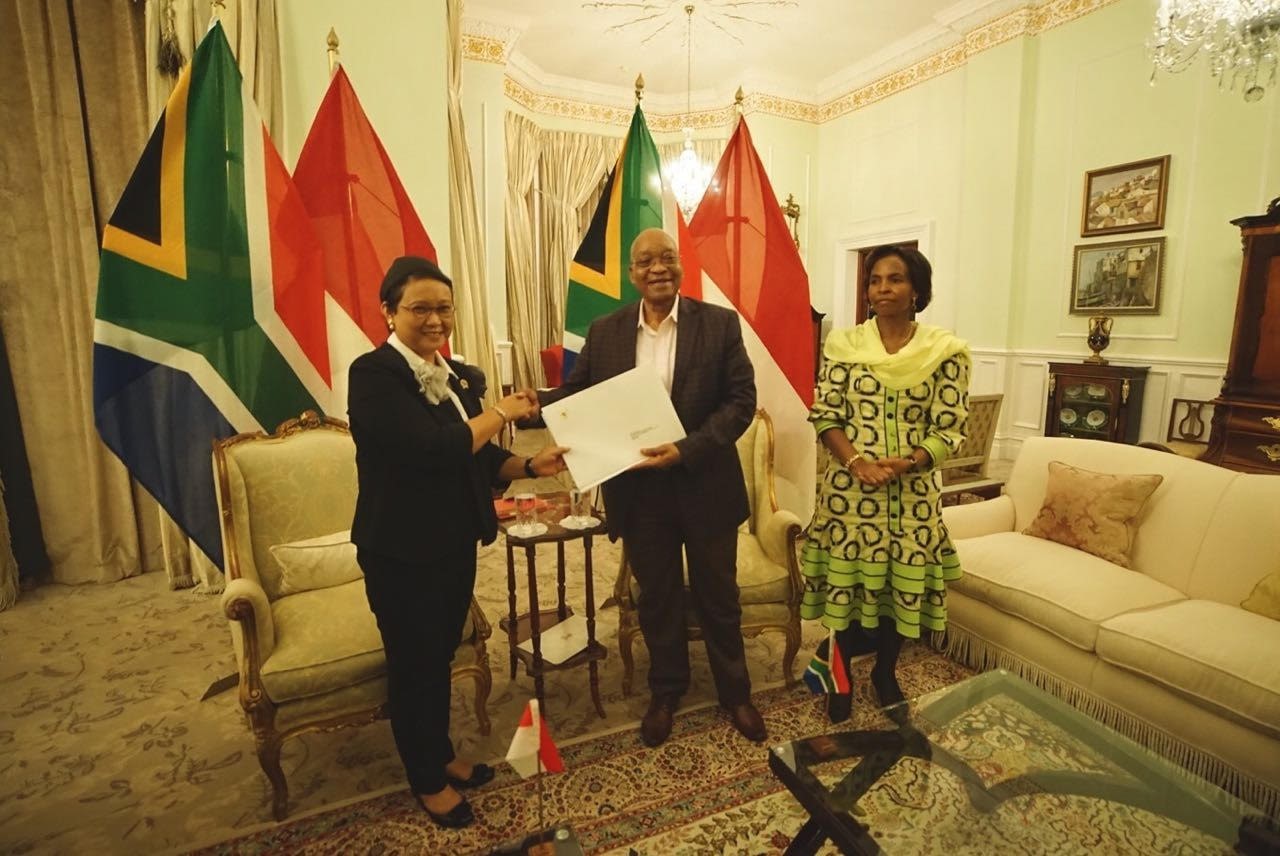Popular Reads
Top Results
Can't find what you're looking for?
View all search resultsPopular Reads
Top Results
Can't find what you're looking for?
View all search resultsIndonesia and South Africa: Solidarity that seeks shared prosperity
Indonesian scholars, religious leaders, artists and royalty enslaved or imprisoned by the Dutch carried with them to the Cape the rich traditions of learning, as well as the Islamic faith.
Change text size
Gift Premium Articles
to Anyone
I
ndonesia and South Africa share an unshakable bond forged in the struggle against oppression. We are proud of a partnership that fought the viciousness of slavery, colonialism and apartheid.
Our histories became entwined when Dutch invaders seized both our lands and subjugated our peoples. Our independent entities in Southeast Asia came to be named by the colonial power and its private companies as the Dutch East Indies centered on Batavia.
The Dutch bizarrely named the land at the southern tip of Africa the Cape of Good Hope. Both our peoples put up fierce resistance. That resistance was, however, stymied by superior European armaments.
We remain grateful to South Africa’s indigenous people who embraced our brothers and sisters as their own, granting them succor in times of strife. Not only do we share a history of political struggle, but our bloodlines also merged in the rich diversity of the South African people, notably in the community that became known as Malay at the Cape.
Indonesian scholars, religious leaders, artists and royalty enslaved or imprisoned by the Dutch carried with them to the Cape the rich traditions of learning, as well as the Islamic faith.
Our history books record that in 1693 Sheikh Yusuf from Makassar was exiled to the Cape for his part in the resistance of Sultan Ageng Tirtayasa of Banten against the Dutch invasion. A township of that name on the Cape Flats remains as an homage to him.
Over the past century, scholars from both our countries and farther abroad have demonstrated that the Afrikaans language is a product not of the Dutch colonizers but of the oppressed African peoples. We also take pride in the record of the Holy Quran having been written in Afrikaans long before it became an official language of South Africa.
When the flames of anticolonial resistance started to burn again in the early 20th century, Indonesian and South African revolutionaries were to again act in solidarity in the quest for our mutual freedom. We participated in anti-imperialist conferences of various sorts in different parts of the world.
The best known of these in South Africa’s liberation history is, of course, the 1955 Bandung Conference hosted by Indonesia’s first president, Sukarno. The 29 African and Asian countries, some of which had become independent by this time, represented 1.5 billion people, 54 percent of the world’s population at the time. While the conference was organized in partnership with fraternal nations, it was a deep honor and privilege for Indonesia to be the host.
We [...] are encouraged by scholarly exchanges that have been largely unprompted by our governments.
The Bandung Conference added fuel to the flames of revived resistance to colonial rule. Most of the countries represented in Bandung were soon to win their independence. The last of those was, of course, South Africa, which made the defeat of apartheid a bittersweet victory.
As South Africa celebrates the silver jubilee of its freedom this year, August also marks 25 years since we opened Indonesia’s embassy in the country. South Africa opened its embassy in Jakarta in 1995 and we were pleased to receive then-foreign minister Alfred Nzo for the official inauguration of that mission in 1997.
No tribute to our firm diplomatic relations can go without reference to the late president Nelson “Madiba” Mandela. Then president Soeharto was pleasantly surprised when Madiba arrived in Jakarta in 1997 wearing a batik shirt. That came to be known as his signature garment, breaking with the colonial hangover of jackets and ties.
We have learned that it was the South African designer Desre Buirski who was responsible for Madiba’s iconic silk batik clothing, now known as the Madiba shirt. It is also understood that the late Indonesian designer Iwan Tirta also designed shirts for Madiba.
Indonesians can only be proud that one of our national dresses has come to be so closely identified with one of our closest partners in the world community of nations. Bilateral relations between Indonesia and South Africa are on firm foundations and we cooperate in a large number of international treaties and councils.
South Africa is Indonesia’s largest trading partner in Africa. We are especially keen for this relationship to grow. The spirit of Bandung was essentially about South-South partnership and trade. We believe there to be great complementarities in our economies.
We remain keen to share scientific expertise and are encouraged by scholarly exchanges that have been largely unprompted by our governments. While manufacturing is a large part of both our economies, we are keen to grow other sectors like tourism, beneficiation of raw materials and green technologies.
We also have a comprehensive strategic partnership between Indonesia and South Africa. This was signed on March 17, 2008, by the then-president Susilo Bambang Yudhoyono and president Thabo Mbeki.
We are confident that going forward into the next 25 years our political, trade and people-to-people diplomacy will serve to strengthen our formidable shared history and contribute to mutual prosperity.
We congratulate the South African government and people on the celebrations of 25 years of freedom and democracy, as well as the opportunity to be hosted in this remarkable country during the past quarter-century.
***
Indonesian ambassador to South Africa, Botswana, Lesotho and Eswatini. The views expressed are his own. The original article first appeared in the Daily Maverick.











